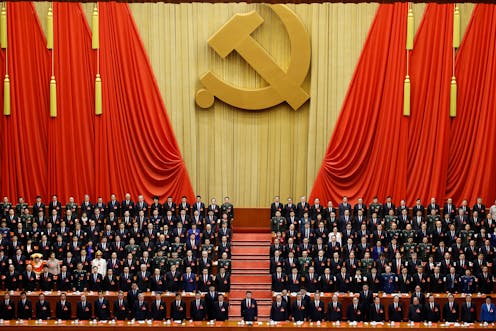China's ambition burns bright – with Xi Jinping firmly in charge
- Written by Nick Bisley, Executive Director of La Trobe Asia and Professor of International Relations, La Trobe University

The most important political event of 2017, the 19th Chinese Communist Party Congress, has concluded. And while there was much to digest, one image above all stands out: Xi Jinping’s political dominance and his burning ambition for China.
The party congress is held every five years and has two main functions. The first is to lay out the policy program for the coming half-decade. The other is to confirm the people who will occupy the key leadership roles within the party. In short, it’s about policy and people.
The tone was set at the Xi’s opening address. Formally presenting the work report of the 18th Central Committee, he outlined the huge steps China has taken over the past five years and his vision for China over not just the next five years, but out to 2049 – the centenary of the People’s Republic of China’s foundation.
He affirmed that within a few decades, China would become a prosperous modern socialist society and the world’s most important country, both in terms of national power and international influence.
Gone is the old dictum that China has to bide its time and hide its power. Humility and caution have been replaced by confident and assertive leadership.
Xi also declared that China would remain economically open and provide leadership on climate change and other environmental concerns. The centrepiece of China’s international policy will be the Belt and Road Initiative that is now part of the party’s constitution.
But Xi was equally stern about threats and challenges, whether from within or beyond – the country would use all means to defend its interests and sovereignty. This means China’s muscular approach to disputes in the East and South China Sea, with India and elsewhere, is certain to continue.
Hard work, ongoing reform and leadership will be needed to bring all this about. The only force capable of doing this, made clear at the congress, is the Chinese Communist Party.
While nods were made toward market forces playing a more important role in resource allocation, the congress’ message was unmistakable: the key player in the economy, indeed in all aspects of Chinese life, will be the party. This is Leninism for the 21st century.
And the party will be unified around an austere vision laid out by Xi. The anti-corruption program that has been such a significant part of his first five years in office will become a permanent campaign.
Xi had launched the anti-graft measures to root out the significant problem of corruption, but also to eliminate rival centres of power. That will be a core element of party business in the future.
In his first five years, Xi focused on consolidating his power base, unifying the party and presenting a more confident face to the world. The congress made clear that the next five are about paramount leader Xi driving China to its position atop the international totem pole.
At the very start of the congress, the opening address gave a clue as to what was coming the work program presented by Xi was “for a new era”.
Xi made clear that the People’s Republic of China’s history can be divided into three eras. The first was the creation of the republic, led by Mao. The reform period, led by Deng Xiaoping was its second. Now the third era, in which the “Chinese dream of national rejuvenation” to be realised by Xi, has begun. With the Leninism of party centrality has also come a disturbing nascent cult of personality.
To formalise this on the congress’ final day, delegates unanimously voted to incorporate “Xi Jinping thought on socialism with Chinese charactersitics” into the party constitution. His is now a core purpose of the party and marks him out as the most powerful figure within the party for so long as he remains alive.
Prior to the congress there was much speculation about whether or not he would seek to break the party norm of two five-year terms as general secretary. By this move he has rendered such questions moot.
Whether he remains in office for more than five years or whether he formally stands down has become almost immaterial: he will be the dominant figure in the country.
To reinforce this, when the new seven-man standing committee of the politburo was announced the day after the congress’ conclusion there was no obvious successor as part of the grouping. All five of the new faces – Li Zhanshu, Wang Yang, Wang Huning, Zhao Leji and Han Zheng – will need to retire at the next congress. So while the leadership is new, it is entirely subordinate to the general secretary.
Xi now clearly sits atop the party and the party commands China. Over the coming three decades China will seek to become the world’s dominant country.
Notwithstanding Xi’s huge confidence there is a very considerable amount of work to be done to realise these ambitions. It is far from certain whether China’s economy be reformed in the ways necessary to drive the levels of growth needed to fuel this program.
Equally, the party will face continual challenges of unity and legitimacy.
Internationally, it is difficult to imagine the US acquiescing to China’s desire to supplant it at the centre of world affairs.
Authors: Nick Bisley, Executive Director of La Trobe Asia and Professor of International Relations, La Trobe University
Read more http://theconversation.com/chinas-ambition-burns-bright-with-xi-jinping-firmly-in-charge-86307





